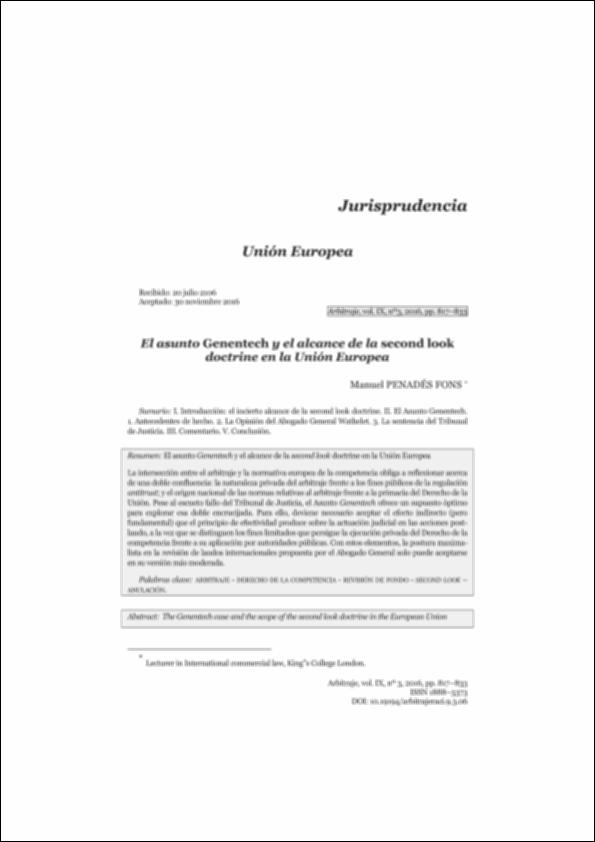Please use this identifier to cite or link to this item:
http://hdl.handle.net/10637/12618El asunto Genentech y el alcance de la second look doctrine en la Unión Europea .
| Title: | El asunto Genentech y el alcance de la second look doctrine en la Unión Europea . |
| Authors : | Penadés Fons, Manuel |
| Keywords: | Arbitraje.; Derecho de la competencia.; Revisión de fondo.; Anulación.; Arbitration.; Competition law.; Review on the merits.; Second look.; Setting aside. |
| Abstract: | La intersección entre el arbitraje y la normativa europea de la competencia obliga a reflexionar acerca
de una doble confluencia: la naturaleza privada del arbitraje frente a los fines públicos de la regulación
antitrust; y el origen nacional de las normas relativas al arbitraje frente a la primacía del Derecho de la
Unión. Pese al escueto fallo del Tribunal de Justicia, el Asunto Genentech ofrece un supuesto óptimo
para explorar esa doble encrucijada. Para ello, deviene necesario aceptar el efecto indirecto (pero
fundamental) que el principio de efectividad produce sobre la actuación judicial en las acciones postlaudo,
a la vez que se distinguen los fines limitados que persigue la ejecución privada del Derecho de la
competencia frente a su aplicación por autoridades públicas. Con estos elementos, la postura maximalista
en la revisión de laudos internacionales propuesta por el Abogado General solo puede aceptarse
en su versión más moderada. The intersection between arbitration and the European rules on competition poses questions on a double crossroads: the private nature of arbitration vis-à-vis the public aims of antitrust law; and the national origin of the rules on arbitration vis-à-vis the primacy of EU law over national law. Notwithstanding the succinct judgment of the CJEU, the Genentech case offers an optimum opportunity to explore that double meeting. To that end, it is necessary to acknowledge the indirect (yet fundamental) effect that the principle of effectiveness produces on the judicial adjudication of postaward actions, while at the same time distinguishing the limited aims of private enforcement of competition law compared to its application by public authorities. With these elements, the maximalist position on the review of international awards proposed by the Advocate General can only by accepted with severe qualifications. |
| Description: | En: Arbitraje: revista de arbitraje comercial y de inversiones. eISSN. 2603-9281. vol. 9, n. 3, 2016, pp 817?833 |
| URI: | http://hdl.handle.net/10637/12618 |
| Rights : | http://creativecommons.org/licenses/by-nc-nd/4.0/deed.es |
| Issue Date: | 30-Nov-2016 |
| Appears in Collections: | 2016 Arbitraje nº 3 |
Items in DSpace are protected by copyright, with all rights reserved, unless otherwise indicated.


